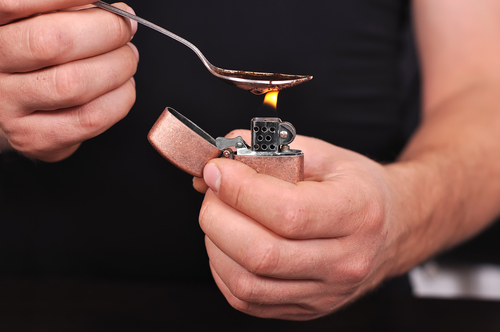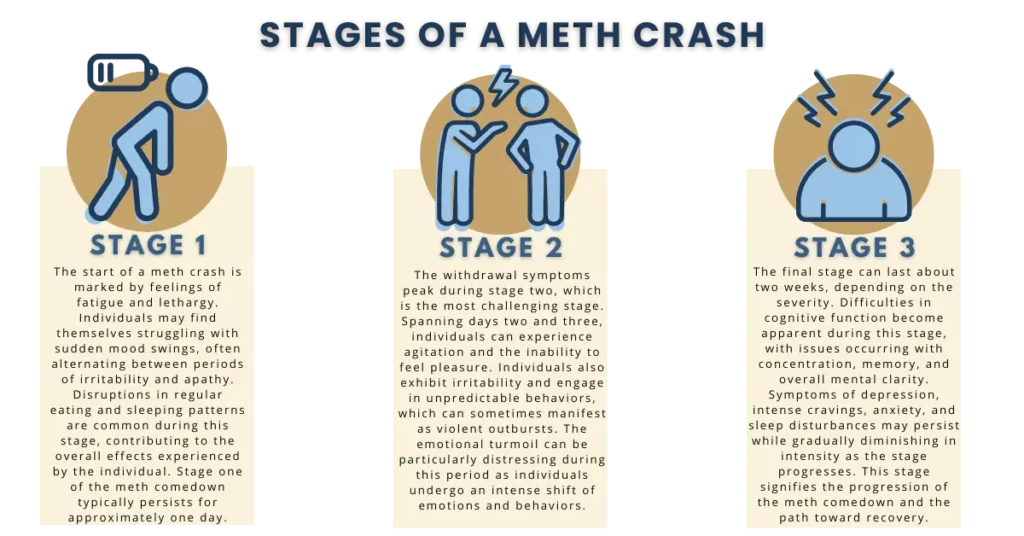In the world of substance abuse, methamphetamine stands as a potent and notorious stimulant, capable of inducing intense highs and dangerous withdrawals. As individuals decide to stop using methamphetamine, they experience a phenomenon called a ‘meth crash.’ This guide serves to provide insights into meth crashes, including the signs, stages, and path to sobriety. By doing so, individuals can effectively manage the aftermath of meth abuse and begin the journey toward a healthier future.
What is a Meth Crash?
A meth crash, also referred to as a meth comedown or meth withdrawal, is the severe physical, mental, and emotional aftermath that occurs following the use of methamphetamine, a powerful and highly addictive stimulant drug. This typically happens once individuals stop using meth and can be a sign of meth addiction. This phenomenon is the direct result of the drug’s effects on the body.
Signs of a Meth Crash
The signs of a meth crash can vary depending on the individual. However, there are some common signs to be aware of when withdrawing from meth. These signs can cause physical and psychological side effects on the individual. As these signs happen immediately after meth use, it is essential to experience these effects in the presence of a medical professional. Some of the most common signs to be aware of may include the following:
- Extreme fatigue
- Severe depression
- Anxiety
- Restlessness
- Difficulty concentrating
- Headaches
- Muscle pain
During this crash, individuals may also experience intense cravings for the drug. These cravings may become so intense that individuals have little self-control and can relapse. To manage this, withdrawing from meth is best done in a treatment center.
Learn More: Meth Mites: The Imaginary Bugs of Meth Use
The Stages of a Meth Crash
A meth crash happens in three different stages, as the body gradually eliminates the drug. Each stage has distinct effects on the body and mind and lasts for varying amounts of time. The entire process of experiencing a meth crash lasts around 2 to 4 weeks, with drug cravings lasting for several weeks afterward. However, individuals may start experiencing the stages of a meth crash 12 to 24 hours after their last dose.
Stage 1
The start of a meth crash, referred to as stage one, is marked by feelings of fatigue and lethargy. Individuals may find themselves struggling with sudden mood swings, often alternating between periods of irritability and apathy. Disruptions in regular eating and sleeping patterns are common during this stage, contributing to the overall effects experienced by the individual. Stage one of the meth comedown typically persists for approximately one day.
Stage 2
After stage one, the withdrawal symptoms peak during stage two, which is the most challenging stage of a meth crash. Spanning days two and three, individuals can experience agitation and the inability to feel pleasure. Individuals in this phase may also exhibit irritability and engage in unpredictable behaviors, which can sometimes manifest as violent outbursts. The emotional turmoil can be particularly distressing during this period as individuals undergo an intense shift of emotions and behaviors.
Stage 3
The final stage, stage three, can last about two weeks, depending on the severity of the meth addiction. Difficulties in cognitive function become apparent during this stage, with issues occurring with concentration, memory, and overall mental clarity. Symptoms of depression, intense cravings, anxiety, and sleep disturbances may persist while gradually diminishing in intensity as the stage progresses. This stage signifies the gradual progression of the meth comedown and the path toward recovery.
Continue Reading: Meth-Induced Psychosis: Signs, Symptoms, & Treatment Options
How to Safely Manage a Meth Crash
Safely managing a meth crash requires a combination of addiction treatment, emotional support, and a commitment to overcoming drug addiction. Navigating through the physical, emotional, and psychological challenges of the crash necessitates a holistic approach that prioritizes physical and mental health and promotes recovery. Some of the best ways to safely manage a meth crash include the following:
- Medical Detox: Medical detox is the first step in recovering from meth addiction. As an individual goes through the withdrawal process, they may experience severe withdrawal symptoms. To prevent this, individuals should utilize an addiction treatment center to withdraw under the supervision of a medical professional.
- Emotional Support: Having the proper support system can greatly benefit those going through a meth crash. This can be friends, family, peers, or a support group. With this support system in place, individuals can receive care and guidance as they navigate a meth crash.
- Behavioral Therapies: Behavioral therapies, such as cognitive-behavioral therapy, provide the tools necessary to face addiction. A treatment center typically provides these therapies and helps individuals identify patterns, recognize the root causes of addiction, and build coping skills. This would take place after successfully completing the medical detox part of treatment.
- Aftercare Support: As mentioned above, a meth crash can last several weeks. Because of this, it’s essential to have strategies in place to assist individuals in preventing relapse and starting the process over again. These strategies may include support groups, continued therapy sessions, and utilizing healthy coping mechanisms.
Staying Sober with East Coast Recovery Center
Making the choice to become sober from meth can be a difficult and lengthy process. As individuals experience the effects of meth crashes, they may struggle to stay sober. Luckily, there are addiction treatment programs to offer the necessary tools and resources for individuals to recover.
At East Coast Recovery Center, we provide holistic, individual, and effective addiction and mental health care. We utilize evidence-based treatments to address the addiction at its source and provide a successful recovery. We offer various addiction treatment services for many substances, such as meth addiction.
If you or a loved one are struggling with meth addiction or other substance use disorders, contact us today to learn more about our programs.














